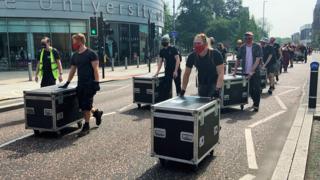
[ad_1]

Music industry crew marched with their equipment cases in Manchester on Tuesday
Music venues, theatres and their workforces are taking part in a day of action around the UK to highlight the crisis facing the live events scene.
Out-of-work music industry crew were among those who took part in a march through Manchester on Tuesday.
More than 300 venues including London’s National Theatre and Royal Festival Hall will turn their lights red later as part of the Red Alert campaign.
Peter Gabriel, Imogen Heap and The Cure have voiced support for the initiative.
The Red Alert movement and #WeMakeEvents marches aim to raise awareness about the threat of job losses in the sector.
Producers, engineers, tour managers, security staff, truck drivers and cleaners also marched past some of Manchester’s closed venues.
Campaigners held up placards as they walked through Manchester
Similar protests are taking place in other cities. The Mac in Belfast, the Blackwood Miner’s Institute in south Wales, the Aberdeen Arts Centre and the Britannia Panopticon Music Hall in Glasgow are among the other venues that will be lit up in red.
Virtually all UK venues have been closed for five months, meaning means many are at risk.
Organisers of Tuesday’s protests say around a million people work in the events sector, many of whom are freelancers, and they are at risk of losing their livelihoods without additional government support.
‘Everything went off like a light switch’
Freelance audio technician Alistair Westell had been booked for several events around the world before the coronavirus outbreak.
“For me personally, everything in my diary popped out in March, including the Olympics in Tokyo, which I should have been working at last week,” he told BBC News. “I’m used to quiet spells, but with this everything went off like a light switch. [Most events] have been pushed back until next year, if at all.
“I must admit, I’ve had a few sleepless nights. Luckily, I have a partner who is still working, but the money I’m living on is savings, so it’s affected us quite badly.”
Westell explained that freelancers and venue staff are crucial to an event’s success, even though they “aren’t very visible”.
“We’re often behind the scenes – if we’re seen it usually means something has gone wrong!” he said. “We try to stay in the background, and that’s one of the reasons we’ve been forgotten.”
The work involved in putting on a live event such as a concert or conference is “a huge team effort”,” he added.
“There’s lighting, graphics, sound, video, rigging, staging… and then you’ve got the other side of it – the toilets and the catering for the audience, artists and crew. Then there’s security – you often see security staff pulling people out of the crowd at the front when they’re in trouble.”
Image copyright
PA Media
The Cure, fronted by Robert Smith, have voiced their support
On Monday, it was announced that Elbow and a string of other the bands will perform one-off gigs to raise money for grassroots music venues.
On Tuesday, the Arctic Monkeys announced a Crowdfunder campaign to raise money for The Leadmill in their home city of Sheffield and other venues.
Nightclub and festival promoter Sacha Lord, who is Night Time Economy Adviser for Greater Manchester, said work by many crucial events staff goes “unseen by the public”.
“From my own experience with [music festival] Parklife, there are about 4,500 people working on that,” he told Radio Manchester.
“The stages don’t erect by themselves, the Portaloos don’t arrive by themselves, the fences, the arenas, the lighting techs, it is a vast swathe of freelancers that work behind the scenes, and sadly they have been forgotten.
Singer-songwriter Peter Gabriel said: “A lot of high arts have now been given some support, but people working on the festival side of things and in live events have been forgotten about.
“Many of these people are freelancers so don’t fall under furlough schemes. So right now they are feeling the pinch very badly.”
Image copyright
PA Media
The National Theatre was wrapped in tape last month as part of another campaign
Last month the government announced a £1.57bn support package aimed at protecting theatres, galleries and museums. The government has previously said that will lead to more work for freelancers.
The furlough scheme and support for self-employed people are due to end in the coming months – and many freelancers were eligible for them at all.
“Without major, immediate support from government, the entire live events sector supply chain is at risk of collapse,” said the members of The Cure in a statement.
“The aim [of the campaign] is to have financial support extended for the people and companies in this sector, until they can return to work.”
Follow us on Facebook, or on Twitter @BBCNewsEnts. If you have a story suggestion email entertainment.news@bbc.co.uk.
[ad_2]
Source link